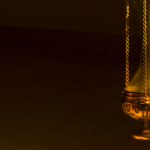SO YOU WALKED BACK IN THE REVOLVING DOOR, AND DID IT ALL AGAIN: Or, more fun with sin!
[EDITED to remove an analogy that was interesting to me, but probably unhelpful in the wider conversation. Also, I need to sleep now, but when I wake up I’ll put in some more links, I think.]
OK, Noli Irritare Leones comments on previous posts here. But this post is actually about Anactoria’s replies to my comments here. And please do read her post before going on with this one, okay?
I think things are getting a bit tangled here. Anactoria and I agree, in many ways, about which issues are connected–but we disagree, I think, about how they’re connected. So let me try to card the wool here. (I suspect this might be more of a riff on her post than a reply to it.)
I thank God that my sins are not like those of this publican!: Anactoria is coming from a tradition in which rejecting the community’s understanding of Christian faith meant that you were shunned, completely cut off from everyone who’d loved you and raised you. I can’t express how awful that sounds. I am so sorry that anyone goes through that–in fact, it’s a part of why I write about my whole deal on this blog, that I hope it will make that horrible breaking of families at least a little less likely. I don’t understand how shunning is Christian and… and I think I should rein myself in, here, because I start wanting to talk about how awful this approach is, and that gets perilously close to a self-righteous focus on Other People’s Faults.
So instead I will just say that I am incredibly lucky that the orthodox Catholics I met were totally awesome, admirable, welcoming people, willing to listen to me babble on about heterosexism or whatever other random thing I wanted to talk about. They were up-front with me about what I’d have to give up, but equally up-front about what they had struggled with in their own lives.
Well I’ve been a drag racer on LSD…: That said: There are a lot of possible methods I don’t think you get to use in order to figure out what is right, what is wrong, what is a dealbreaker when you try to make sense of the world, etc. And my strong impression is that Anactoria is using methods that I just don’t think work, for distinguishing possible belief systems from impossible ones.
“I wouldn’t shun someone who believes his identity is based in doing X” doesn’t mean X is actually okay to do. [this is where the analogy was–and keep in mind that Anactoria says I’m still misreading her in this section….]
In order to figure out if something is okay to do, you can’t just ask whether people who seem like good upstanding citizens (according to some culture or subculture’s definition of “good”!) want to do it. I mean… I know a lot of good upstanding citizens who wouldn’t bat an eye if somebody shoved bamboo sticks up Khalid Sheikh Mohammed’s fingernails. Doesn’t make it right to do. Culture can’t be the final word on moral truth; nor can individual inclination be the final word. This actually strikes me as one of the stronger arguments that if there is a distinction between right and wrong, it requires a Creator God.
Strange things seem to occur, somewhere behind the nursery door: And now we get to the question of original sin.
Look–I find that language really illuminating. I think Augustine’s influence on our understanding of the inclination to sin is right-on and awesome. It explains cultural myths of a Golden Age (Orwell yay!); it is dark in the right places (Pat Barker yay!) and bright wherever it can be. I’ve written here and here (bonus Queen reference!) about life as exile from Adam’s happiness.
But a good friend pointed out that the language of “original sin” might be getting in the way here. And that might well be true. I know I had a really hard time taking Christianity seriously until I a) met awesome Christians and b) read St Anselm’s Cur Deus Homo (How God Became Man) and thought, “Hey wait now–is that what Christians mean when they say ‘sin’? Because that actually makes sense!” …Plus, I remember how an Eastern Orthodox friend had to explain to freshmen, every single year, “Christians don’t think you need to feel guilty for original sin!”
So okay. I like the language of original sin, because it implies a homeland and an exile. But if it doesn’t work for you, okay. All I am really talking about in the previous post is an undertow: a terrible riptide pulling us toward sin.
I don’t think we stand in front of a crossroads and calmly choose good or evil. I think it’s more bewildering than that, less rational. We choose wrongdoing when it won’t benefit us; we choose it even when we know it will hurt us. We choose it when we really don’t know why–and when no explanation really explains why.
And I think we do this because something very big has gone wrong. One of the most compelling things, to me, about the Christian story, is that it responds to my sense that something terrible has happened. Something equally great and terrible has to respond to the shock and sorrow and outrage with which it’s appropriate to meet what we see in the world every day. The torture and death of God seems… lurid enough for a lurid world.











